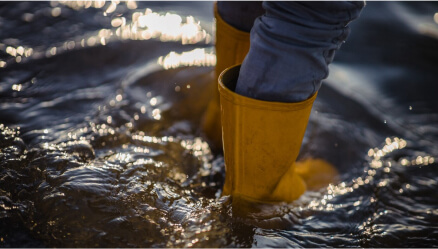Water damage can be a significant concern for commercial property owners, leading to costly repairs, disruptions in operations, and potential loss of business. Preventing and mitigating water damage requires a proactive approach and a thorough understanding of potential risks. At Hopkins Restoration, we’re committed to helping commercial property owners protect their investments. Here are essential tips to help you prevent and manage water damage effectively.
1. Regular Inspections and Maintenance
Routine inspections of your property’s plumbing, roofing, and drainage systems are crucial. Look for signs of wear and tear, leaks, or blockages that could lead to water damage. Schedule regular maintenance checks with professionals like Hopkins Restoration to ensure all systems are functioning correctly and to address any issues before they become major problems.
2. Invest in Quality Roofing
The roof is your first line of defense against water damage. Invest in high-quality roofing materials and ensure proper installation. Regularly inspect your roof for damage or debris that could obstruct proper drainage. Hopkins Restoration recommends scheduling professional roof inspections at least once a year to catch any issues early.
3. Ensure Proper Drainage
Effective drainage systems are essential to prevent water from accumulating around your property. Ensure that gutters and downspouts are clear of debris and functioning correctly. Install gutter guards to minimize clogging and direct water away from your building’s foundation. Proper grading around the property also helps direct water away from the structure.
4. Monitor and Repair Leaks Promptly
Leaks, whether from pipes, windows, or doors, can lead to significant water damage if not addressed promptly. Regularly inspect areas prone to leaks, such as basements, ceilings, and walls. At the first sign of a leak, contact Hopkins Restoration to assess the situation and perform necessary repairs to prevent further damage.
5. Implement Water Detection Systems
Consider installing water detection systems that can alert you to leaks or excess moisture before they cause significant damage. These systems can be particularly useful in areas prone to water damage, such as basements or near water heaters. Early detection can help mitigate damage and reduce repair costs.
6. Protect Your Property with Sump Pumps
For properties in flood-prone areas or with basements, sump pumps are a valuable investment. These devices help remove excess water from basements and crawl spaces, reducing the risk of flooding and water damage. Ensure your sump pump is regularly maintained and tested to ensure it functions correctly when needed.
7. Create an Emergency Response Plan
Having a clear and actionable emergency response plan is crucial for managing water damage effectively. This plan should include steps for shutting off water sources, contacting emergency restoration services like Hopkins Restoration, and communicating with employees or tenants. Regularly review and update your emergency response plan to ensure it remains relevant and effective.
8. Educate Staff and Tenants
Educating your staff and tenants about water damage prevention is essential. Provide training on how to spot potential issues, such as leaking pipes or water stains, and how to report them promptly. By involving everyone in the prevention process, you can reduce the risk of water damage and ensure a quicker response to any issues that arise.
9. Inspect and Maintain Appliances
Regularly inspect and maintain appliances that use water, such as HVAC systems, water heaters, and washing machines. Ensure they are in good working condition and address any leaks or malfunctions immediately. Hopkins Restoration can assist with inspecting and maintaining these appliances to prevent potential water damage.
10. Address Moisture Issues Quickly
Moisture is a key factor in water damage and mold growth. If you notice any areas of excess moisture, such as damp walls or floors, address them immediately. Use dehumidifiers and fans to dry out affected areas and consider professional water damage restoration services from Hopkins Restoration if needed.
FAQs
Q: What should I do if I find water damage in my commercial property?
A: Contact a professional restoration service like Hopkins Restoration immediately. Quick action can prevent further damage and reduce repair costs.
Q: How can I prevent water damage during heavy rain or storms?
A: Ensure your property’s gutters and downspouts are clear and functioning properly. Consider installing flood barriers and sump pumps, and regularly inspect your roof and drainage systems.
Q: What are the signs of potential water damage?
A: Look for signs such as water stains on walls or ceilings, damp or musty odors, and mold growth. Regular inspections and prompt repairs can help address these issues early.
Q: How often should I schedule maintenance for my property’s plumbing and roofing systems?
A: It’s recommended to schedule professional inspections at least once a year. Regular maintenance helps identify and address potential issues before they lead to significant damage.
Q: Can water detection systems really help prevent damage?
A: Yes, water detection systems can alert you to leaks or excess moisture early, allowing you to take action before significant damage occurs. They are a valuable tool in preventing water damage.
Conclusion
Preventing and mitigating water damage is essential for protecting your commercial property and maintaining business continuity. By implementing these essential tips and working with professionals like Hopkins Restoration, you can safeguard your property from water-related issues and ensure a swift response in case of emergencies. Regular inspections, proper maintenance, and timely repairs are key to maintaining a dry and secure commercial space.
For expert assistance and advice on preventing and managing water damage, contact Hopkins Restoration today. We’re here to help you protect your property and ensure it remains in top condition.


